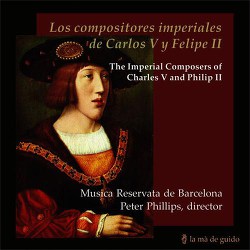MAY 2016: Los compositores imperiales de Carlos V y Felipe II | Musica Reservata de Barcelona | La ma de Guido LMG2092
MAY 2016: Los compositores imperiales de Carlos V y Felipe II | Musica Reservata de Barcelona | La ma de Guido LMG2092
By RAY PICOT
This very interesting disc from Musica Reservata de Barcelona offers an overview of the music written for and performed in the Spanish imperial court during the 16th century, a time that has become known as Spain’s ‘Golden Age’. Politically there were two powerful monarchs at this time, Charles V, the Holy Roman Emperor, also known as Charles I of Spain (amongst other royal titles), and his son Philip II (who was briefly married to Mary I of England). From a historical perspective, this was the time of Habsburg dominance and as Holy Roman emperor, Charles commanded great wealth and resources. When he first arrived in Spain in 1516, Charles he did not speak any Spanish but his son, Philip, who took over the reins of power in 1556, ruled as a Spanish monarch. This was a time of considerable political upheaval, with Charles wielding great influence, in no small part militarily. However, Charles was a cultured man and had a strong interest in music. It is known he brought with him his own Flemish choir led by the renowned Nicolas Gombert. In addition he had a choir established for his wife Isabel of Portugal and also a choir of Spanish performers connected to the Royal House of Castile. The music on this disc covers the wide range of music written for these monarchs, starting with a motet celebrating Philip’s birth in 1527 and ending with the commemoration of his death in 1598.
It could be argued that the influx of the better-known European (mostly Flemish) musicians acted as a catalyst for Spanish musicians who were developing a musical style of great distinction. The album juxtaposes acapella vocal music with purely instrumental pieces, written by perhaps the most famous composer of music for the organ of this era, Antonio de Cabezón, played by Ignasi Jorda. The composers selected make it clear that Charles attracted many of the most famous European musicians of his day to his court, which on this disc include Nicolas Gombert, Josquin des Prez, Philippe Rogier, Pierre de Manchicourt and Thomas Crecquillon, alongside the Spaniards, Cristobal de Morales, Fernando de las Infantas, Hernando de Cabezón and Ambrosio Cotes.
The choir was formed in 1991 and have established themselves as authoritative interpreters of ‘early music’ and tend to utilise guest music directors. On this disc they are directed by Peter Phillips, who most of you will know from the Tallis Scholars. His knowledge of 16th-century musical lingua franca is outstanding, and he brings a quiet authority to these performances. Tempo-wise, compared to alternative readings, he offers a more expressive styling which suits this choir and plays to its strengths. The vocal sound is fresh and clear with excellent enunciation, with characterful and committed singing throughout. The sound is very well balanced and I was pleased to note the inclusion of texts in the booklet. The music chosen mainly comprises motets 'de ocasion', which are relatively short in duration, with some excerpts of mass settings. Many of the works were unfamiliar to me but after several plays, I found they were well chosen and worked well together on this disc, with the inclusion of three Cabezón Tientos, offering an attractive contrast.
In short this was a surprising and rewarding album surveying music and its slowly changing styles over the course of century, and one that can be warmly recommended.
Site design and content copyright © 1998-2023
The Iberian and Latin American Music Society, all rights reserved.
ILAMS is a registered charity, No. 1092749